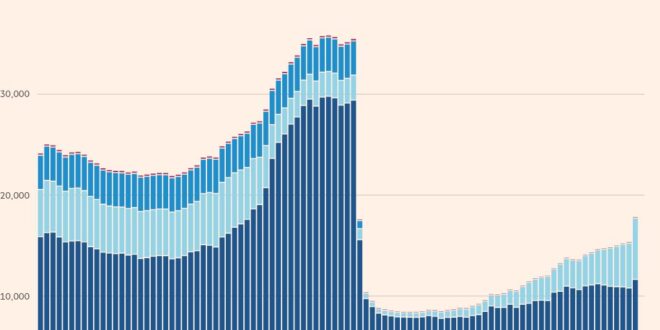This is a version of the Europe Express Newsletter that we have posted online. Sign up here Get the newsletter delivered to your inbox each weekday, and every two weeks on Saturday morning. Browse all our newsletters.
Welcome back. Spain and Portugal experienced a devastating power outage Monday that brought both countries to an abrupt halt.
The Iberian Peninsula is a bit of an island in terms of energy, as it has few connections with European grids. With its abundance of sunshine and wind, the region has been at the forefront of efforts to reduce carbon emissions. A failure there has potentially huge implications for the energy transition in the rest of Europe, arguably the biggest industrial, economic and societal transformation for decades — one that is being increasingly contested politically. The failure of the net zero policy and the switch to renewables was a gift for those who oppose it.
Many experts have refuted claims that solar and wind energy per se are to blame. As the FT editorial board noted, a systemic collapse of the grid should serve as a warning to governments around world that they need to improve network resilience. Ben.hall@ft.com is my email address.
Radio silence
The blackout was a major disruption, and caused distress for many people. It closed businesses, left travellers stranded, and cut off mobile communication. Once again, the Spanish showed their impressive Civismo It was their public spirit or handling of the pandemic that characterized their handling last year. It was a trip back to the analogue age when radio was the only information source. Batterie-powered sets quickly sold out In stores in Madrid
Most of the lights came back on Tuesday morning. For days, the cause of the power outage was unknown to Spaniards and Portugueses as well as their European neighbors.
Blame the game
In Spain’s highly polarised political climate, it was not surprising that the leftwing government led by prime minister Pedro Sánchez would take the blame. It has increased the rollout of renewables and plans to phase out nuclear energy by 2027.
After the Valencia floods, Sánchez’s government and the opposition conservative People’s Party, which runs the regional government, attacked each other for failing to warn residents of the impending deluge.
This week Alberto Núñez Feijóo, the PP leader, criticised the government’s “information blackout” and said the nuclear phase out plan would make Spain’s energy supply more unstable. Santiago Abascal is the leader of Vox, a hard-right party. demanded the government abandon its “climate fanaticism”. He and others from Vox have pointed out, in a playful way, that the blackout happened shortly after the judge in Badajoz announced she was going to press charges against David’s brother for abuse of public offices.
The prime minister has meanwhile pinned the responsibility on Spain’s private-sector energy companies, including Red Eléctrica, which operates the high-voltage grid. Iberdrola and other electricity generators have stated that it is RE’s responsibility to explain the problem. RE, in turn, has blamed the electricity generators.
Beatriz Corredor – chair of RE, a close friend of Sanchez’s and a political ally for many years – gave several interviews to defend the operator. She said that it had done no wrong. She claimed that its rapid reconnection to the grid was proof of it being the “best” network provider in Europe. The tone of the corporate communications was non-existent. RE failed to prevent the entire power supply from collapsing, which was its job. Punto.
Inertia: good and bad
The grid collapse was attributed by many experts to the grid’s failure to handle a high proportion of solar energy on Monday. In this article, my colleague Ian Johnston speaks to some of these experts. Here’s an explanation from earlier this week.
The voltage surged and the frequency dropped below the 50 Hz required by the grid. Normaly, the operator uses the spinning turbines of conventional power plants as inertia to balance the frequency. It appears that for some reason it didn’t have enough “rolling-synchronous capacity” (as experts refer to it) to complete the task before the system failed.
This article will give you a detailed account of the likely events. interview Jorge Sanz is a former Spanish energy official who served as a board member of the International Energy Agency. He spoke with Ethic, an online magazine in Spanish. Ed Conway from Sky News explains the importance of power grid inertia in this article. thread X.
As experts have warned, these are complex technical questions and it is easy for people to jump to conclusions. Does Spain’s “energy security” really threaten Europe?over-relianceWhat about intermittent wind and solar? Does it simply lack the tools to manage these sources?
Grids, along with maintaining some turbine capacity, should invest in technologies that will keep the supply of power stable, such as artificial intelligence. Batteries are able to provide instant balancing but this article suggests that batteries may not be the best option. report El Confidencial in Spanish: Spain is behind other countries by years when it comes installing battery storage.
Antonio Cabarga works as an electrical system engineer. pointed out LinkedIn says that installing frequency inverters for renewable energy installations is easy. They can mimic turbines and provide “synthetic kinetic inertia” in the grid. However, Spanish law does not permit its use yet.

The government does not give enough consideration to upgrading electricity networks. This is perhaps because they do so to avoid having to acknowledge the additional costs of renewable energy. It is to the European Commission’s credit that it has been drumming on this issue for some time. It is 2023 grid action plan noted that 40 per cent of Europe’s network infrastructure is more than 40 years old and with the planned doubling of cross-border interconnections by 2030, it would need €584bn in new investment.
Mario Draghi’s competitiveness report The importance of investment in grids, and cross-border connections was also highlighted. Although a more extensive power link with France might not have prevented the blackout on Monday, it could make power supply more reliable and efficient.
The governments and grid operators in Europe will be under increasing pressure to prove that they are doing what is necessary to avoid a similar blackout. Otherwise, voters may lose trust in the green shift.
Here’s more on the topic
The great grid crisis — a deep dive by Rachel Millard in London, Jamie Smyth in New York and Ian Johnston in Paris
Ben’s pick for the week
Laura Dubois explains that Russians with Ukraine War links were sold Maltese “golden’ passports by Laura Dubois
 Costa News Spain Breaking News | English News in Spain.
Costa News Spain Breaking News | English News in Spain.








